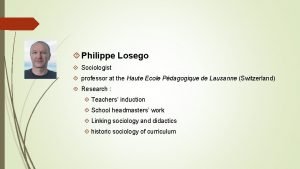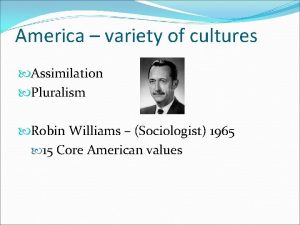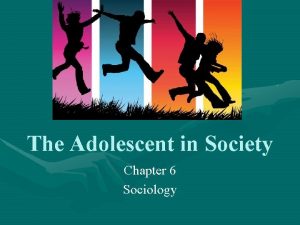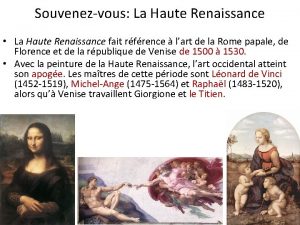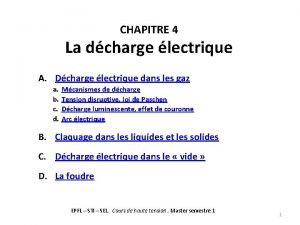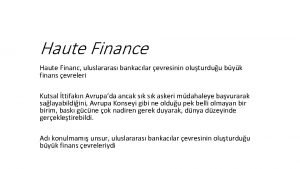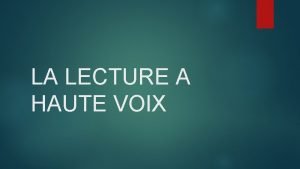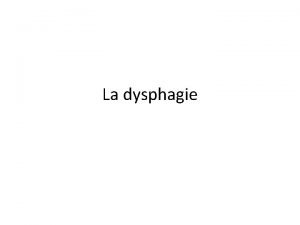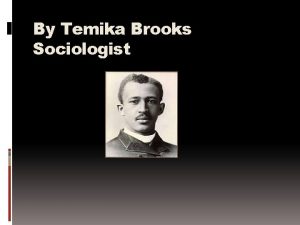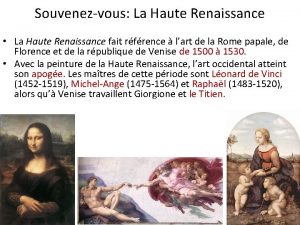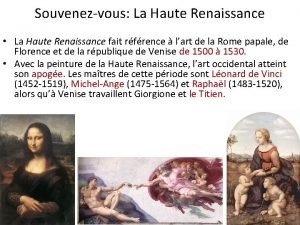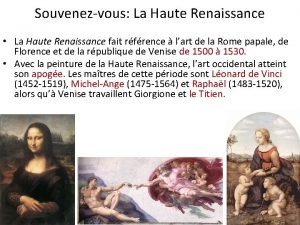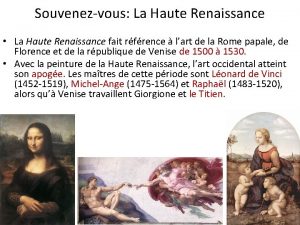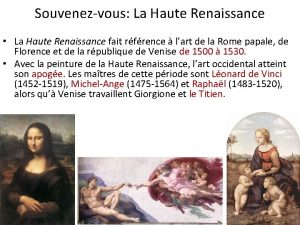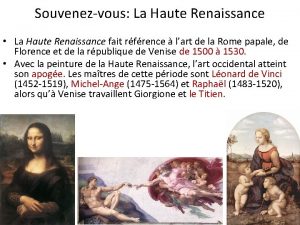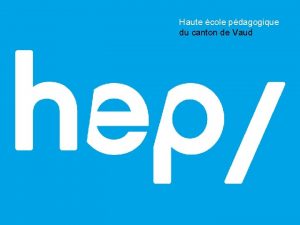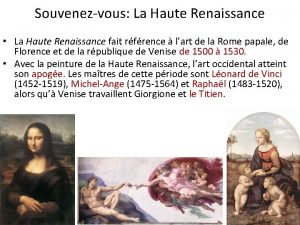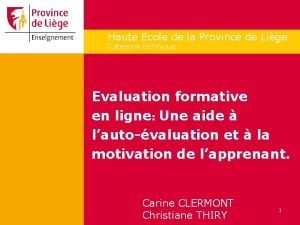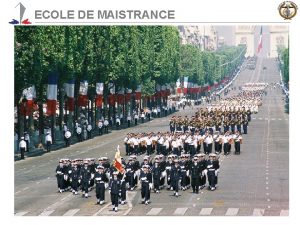Philippe Losego Sociologist professor at the Haute Ecole













































- Slides: 45

Philippe Losego Sociologist professor at the Haute Ecole Pédagogique de Lausanne (Switzerland) Research : Teachers’ induction School headmasters’ work Linking sociology and didactics historic sociology of curriculum

Curriculum and schooling regime in secondary education From distinction to evaluation (1870 -2015)

Main hypothesis My current research topic is about the evolution of secondary education curriculum over time. The main hypothesis of my work is that variations of the curricula over time can be explained by what I call “schooling regime”.

International perspective This research relies on a yet incomplete literature study. So far is dealing with the history of England, Germany and France. From the end of the XXth century, the history of all countries tends to get closer.

What is a curriculum? A curriculum is : 1. A set of school subjects 2. A (dis)connection with everyday life. 3. A hierarchy between subjects (M. Young) 4. A form of the subjects (B. Bernstein)

How can schooling regime determine curriculum? A curriculum is not just a set of knowledge. Curriculum is a medium: for social school relationships for a society-school relationship

A medium for social school relationships Curriculum is a direct medium…. between teachers and students Among students

A medium for society-school relationships Curriculum is an indirect medium… between successful and failing students between students and no-students

A medium for society-school relationships Society and secondary education are not two separate entities. Secondary education is part of an industrial society Its place and role vary a lot over time

Three historic phases Schooling regimes Elite (+/-5%) 1870 -1960 Mass (+/-50%) 1960 -1990 Universalization (+/-100%) 1990 -… Society-secondary Distinction education relationships Meritocracy Evaluation School social Segregation relationships Selection Inclusion Curricula Disciplined Standardized Disinterested

The disinterested curriculum (1870 -1960)

The disinterested curriculum (18701960) Two features of the secondary education curriculum in Prussia, France and England at the end of the 19 th century : 1. Latin remained the most prestigious subject up to 1960. 2. Sciences and national languages entered in the secondary curriculum about 1870 -80 but in a very disinterested form after being considered as utilitarian subjects.

Latin humanities : a very poor teaching model This subject is multi-purpose (grammar, history, literature, morality, etc. ) This subject is not regular. A lot of partial rules and exceptions. Rational learning of Latin is very difficult. After 10 years of study, most of the students are unable to speak, to write and even to understand Latin. So, why is Latin so prestigious at the end of the 19 th century after being under critics from during at least a whole century ?

The disinteresting process of science and national languages In modern education, subjects are submitted to a process of removing all utilitarian knowledge. In the 1840, sciences in secondary education were utilitarian knowledges (chemistry, metallurgy, agriculture, etc. ) From 1880, a new expression appeared : ”scientific humanities” : sciences also can be a purely educative subject without any practical purpose. The same process happened in national languages : from “applied Latin” to literature analysis. How can we explain this transformation from utility to disinterested knowledge ?

The building of secondary education The expression “secondary education” coming from France appeared during the 1830’ to distinguish it from primary education recently created. Latin was the main criteria of difference. During the 18 th century and the first half of 19 th century, the uselessness of latin humanities suffered criticism from aristocracy and upper middle classes, (e. g. from the English “utilitarian” economists and the French Industrialists) However, the social prestige of humanities among upper middle classes increased during the 19 th century and survived up to the 1960’.

The building of social elitism Up to the 1870’, in most of the European countries (Germany, England, France), etc. secondary education was relatively democratic. From the 1870 -1880’ it became more socially segregated. Why ?

Three causes for the social elitism of secondary education 1. The economic power shifted from towns to states 2. A new definition of upper-middle classes 3. The fear of the working classes and the unity of uppermiddle classes

The economic power from towns to states Town’s schools were multi-functional. States built a system with clear segregation between: secondary education higher primary education women's education training schools normal schools

The economic power from towns to states (2) Previously, early leaving was a normal behavior in the towns schools. The now “pure” secondary schools tended to drove away the early leavers to higher primary schools or technical schools. Most of the policies were explicitly oriented toward driving away poor people from the secondary to other forms of post-primary education : higher primary schools, training schools, normal schools In England the number of grants to secondary education was drastically reduced, considered as waste.

Shift in the model of funding Meanwhile the economic model progressively changed from profitability to structural deficit and state-funding. Fees are becoming only social filters, not school funding.

Changes in the definition of middle classes In all European countries the progressive establishing of a universal male suffrage abolished the institutional definition of middle classes. The upper and middle class were previously defined by the right to vote and to be elected. These rights depended on the fortune : tax threshold, ground property, etc. So, the secondary education which did not really interested the upper classes in the first half of the century became a social stake during the second half of the century. Grades for access to universities like “Abitur”, “baccalauréat” or the access to Oxford & Cambridge became a new definition of upper middle classes.

The fear of the working classes and the unity of upper middle classes During a great part of the 19 th century there is almost nothing common between aristocracy, educated but relatively poor middle classes and industry owners. But after several revolutions or social troubles during the century, an ideology of a common culture for the upper middle classes appeared. Latin and Greek humanities, with some religious link, could be this new middle class culture

The segregation social relationships Students are since then channeled from the beginning of their schooling, on base of their social background (money and time). They never meet. This type of relationships supports the belief of a quasi-natural difference between students of different ways and a feeling of equality among students who are in the same stream. Main teachers’ role : avoiding moral disorders

An internal segregation : classical and modern culture All three states (England, Germany and France) did not only protected the secondary education by a external segregation. The secondary education was also subjected to a progressive Internal segregation between… classical education (Latin and Greek humanities) and modern education (sciences, foreign languages, accounting, history, geography) It was much more commented than the external segregation.

An internal segregation : classical and modern culture During the 1 rst part of the 19 th century, modern culture appeared as a complementation of the classical culture. During the 2 nd part of the century, they became two different channels. This separation correspond to a social difference : classical culture for upper middle class and educated middle class students. Modern culture for lower middle class students.

Explaining the prestige of Latin… 1. Institutional cause : both external and internal segregation restricted its access, making it more distinctive. 2. Sociological causes : Latin is useful only for a minority of future scholars and because it is supposed to provide a distinctive manner of speaking national languages. Can constitute the unity of middle class culture. Not related to work. The middle class cycle, from technical innovators to annuitants.

The disinteresting process of science and national languages Causes for the disinteresting process : The generalist shift (F. Ringer, 1987) : a conflict between classical and modern education to be the elite education. From the 1 rst industrial revolution to 2 nd one (companies upsizing, scientific shift from relatively simple to more complex sciences) Applied sciences migrated to training schools or new universities.

The Disciplined curriculum (1960 -1990)

End of the domination of Latin culture 1. Latin was drastically removed from the secondary curriculum and in general mathematics replaced Latin as the dominant subject 2. Subjects took a disciplined form. Objectivity and rationality were supreme values. Few relations to everyday life. Disciplines were self-referenced. Mathematics drove away intuition and graphic representations as proofs in demonstrations. “Modern” mathematics as an ultra rationally-founded subject. National languages comprehended more scientific contents (linguistic). Mathematics and language were divided in sub-disciplines.

Explaining the change of curriculum Why was Latin replaced by Latin as the most prestigious subject ? Why were subjects discipline-shaped ?

Secondary education as a middle school From the 1930, states are trying to unify their educational systems. A unified primary education system is established Lower fees or gratuity for secondary education

Secondary education as a middle school From the post IInd war, a social context of rural flight and progressive decrease of small family businesses (crafts, shops, etc. ) Strong social demand for post-elementary education. Companies are asking for more qualified manpower. The purpose is to find in the working class a major proportion of technicians for industry. Policies of planning the number of graduates by sector Ideological shift from social reproduction to social mobility

Unification vs segmentation Germany, France and England represent three different solutions: 1. Germany, as other central European countries (Switzerland, Austria, etc. ) kept a segregated post-primary education 2. France unified its post-primary system as a comprehensive secondary education for all 3. England also established a comprehensive secondary schools but tolerating some derogatory elitist grammar schools.

Founding a meritocracy Segmented or unified, the relationship between middle school and society was the same : founding a meritocracy. The segmented systems supposed a selection on academic bases at the end of primary school or of a “transition cycle” to channel students in secondary education The unified systems supposed a progressive elimination of students during the process, also on base of academic assessments. Ideology of natural differences replaced by merit as a value

School social relationships Selection. The channeling or streaming of the students relied on academic selection or assessments. Students were frequently challenged and can have to leave their track or leave school. Experiences of inter-individual inequality and of failure are common. Main teachers’ role was selecting students

Explaining the disappearance of Latin’s prestige Distinction is no longer the function of secondary education The uselessness of Latin is no longer a positive value The irregularity of this subject make it of a difficult use to select students However, In the segmented systems of middle schools, a humanistic way remains. Its prestige continued up to the 1980’(case of Germany and Switzerland) There is a direct link between Latin and restricted access

End of the domination of Latin culture Mathematics as the most disciplined subject, is a more straightforward way to certify failure. In general disciplines became scales of measure for school performances

Standardized curriculum(1990 -20. . . )

The standardized curriculum 1. Changes in the hierarchy : from mathematics to national (or school) languages 2. Shift from discipline-shaped knowledge to new forms : “educations” (environmental education, Education for gender equality…) Teaching science by controversies Etc. 3. Knowledge is more related to everyday life

Difficulties from the seventies Unemployment is constantly hitting most of the European societies since the 70’ Public policies gave up planning qualifications according to economic needs and development Education progressively became a personal good Huge expenses in education lead to question its efficiency

The globalization of education The end of bipolar world threw all countries in a global competition International assessments (PISA, TIMSS, PIRLS) are arbitrating global competition for knowledge PISA directly oriented to evaluate middle school

Schooling as a personal good Inclusion. All students, even handicapped students or students with low social background not only accede to secondary education but also have to complete it. Teachers have to support all students. But…. Families try to escape from some schools to avoid social confrontation. Secondary schools try to distinguish themselves and to built some excellence tracking.

What is a standard ? Originally, standards are different from curriculum Standards are skills, that don’t respect the subject forms Usually more related to everyday life. Designed to evaluate curricula, schools and teachers Designed to compare all the students of a territory (country, province, canton, etc. )

The standardized curriculum Curriculum is influenced by evaluation policies. Knowledges are going closer to standards Their main character is their likelihood to be known by a large sample of students. Curricula are more oriented to what students are expected to know than what they should know in an idealistic situation. Knowledge is supposed to be less coherent and more realistic.

The standardized curriculum A lot of countries from 2000, are building a national curriculum. The politic nature of negotiation lead to a somewhat fuzzy curriculum. A new job for teachers is to fill in the blank of curriculum
 Philippe losego
Philippe losego Robin williams core american values
Robin williams core american values Sociologist obtain their knowledge
Sociologist obtain their knowledge Sociologist who studied dating patterns
Sociologist who studied dating patterns Murdock 4 functions of family
Murdock 4 functions of family Promotion from associate professor to professor
Promotion from associate professor to professor La prade haute mont dore
La prade haute mont dore International fashion retail reutlingen
International fashion retail reutlingen Haute renaissance
Haute renaissance Haute estime de soi
Haute estime de soi Ct à haute résolution
Ct à haute résolution Protection ligne haute tension
Protection ligne haute tension Haute finance
Haute finance Hommershoi
Hommershoi Sortie haute saone
Sortie haute saone Tout age porte ses fruits
Tout age porte ses fruits Ponctuation poésie daniel coulon
Ponctuation poésie daniel coulon Voix haute
Voix haute Haute route wandelen
Haute route wandelen Générateur haute tension frelon
Générateur haute tension frelon Haute fréquence
Haute fréquence Dysphagie haute
Dysphagie haute Bảng số nguyên tố lớn hơn 1000
Bảng số nguyên tố lớn hơn 1000 Fecboak
Fecboak đặc điểm cơ thể của người tối cổ
đặc điểm cơ thể của người tối cổ Các châu lục và đại dương trên thế giới
Các châu lục và đại dương trên thế giới Tư thế worms-breton
Tư thế worms-breton Thế nào là hệ số cao nhất
Thế nào là hệ số cao nhất Sơ đồ cơ thể người
Sơ đồ cơ thể người ưu thế lai là gì
ưu thế lai là gì Tư thế ngồi viết
Tư thế ngồi viết Cái miệng nó xinh thế
Cái miệng nó xinh thế Cách giải mật thư tọa độ
Cách giải mật thư tọa độ Bổ thể
Bổ thể Tư thế ngồi viết
Tư thế ngồi viết Thẻ vin
Thẻ vin Thể thơ truyền thống
Thể thơ truyền thống Các châu lục và đại dương trên thế giới
Các châu lục và đại dương trên thế giới Hát lên người ơi
Hát lên người ơi Từ ngữ thể hiện lòng nhân hậu
Từ ngữ thể hiện lòng nhân hậu Khi nào hổ mẹ dạy hổ con săn mồi
Khi nào hổ mẹ dạy hổ con săn mồi Diễn thế sinh thái là
Diễn thế sinh thái là Thế nào là giọng cùng tên?
Thế nào là giọng cùng tên? Vẽ hình chiếu vuông góc của vật thể sau
Vẽ hình chiếu vuông góc của vật thể sau 101012 bằng
101012 bằng
